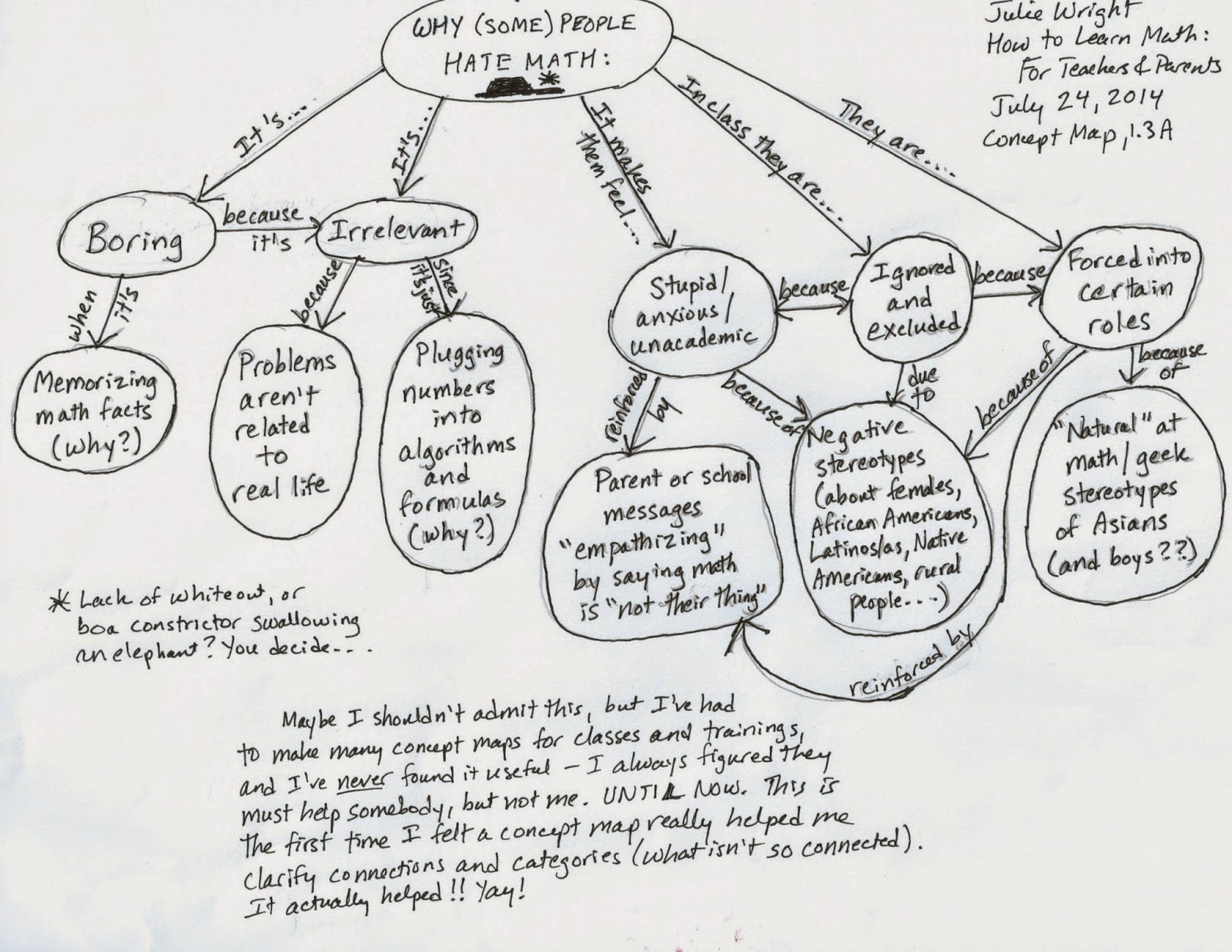This past summer, I took an incredibly good online course called How to Learn Math by Professor Jo Boaler at Stanford University. Its focus is on research on math learning and student mindsets that can transform students' experiences with math.
Near the beginning of the course, Jo Boaler and some of her students talked about some reasons why people often dislike math classes. As a response task, she asked us to summarize the reasons discussed with a concept map. I groaned, because although I am circumspect about sharing this view in education classes, I've despised concept maps ever since first trying one. I believed they must be useful for someone somewhere, so I've occasionally used them in teaching out of a sense of duty, but I consistently felt that rather than highlighting connections and promoting thought, they just resulted in a big muddled blob of words.
Nevertheless, I can comply with educational directives, so I gave it a whirl. To my astonishment, this concept map assignment actually clarified my thinking and made me see things in a new way. But before I get to that, here's the concept map in question:
Thanks partly to wonderful math education classes with Kasi Allen at Lewis & Clark, and partly to my own observations, none of these ideas were new to me, and I think about all of them a lot already. The breakthrough for me, though, was in seeing that the "boring/irrelevant" impressions of math and the "math is not for me because..." impressions of math are really two separate strands. Improving my teaching to address only one strand would help reach some students, but would leave others with their math hatred untouched. The interconnections in each strand might lead to a positive kind of snowball effect within that strand -- for instance, if I help students not to feel ignored and excluded in math because they belong to a certain group, their math anxiety will be reduced -- but to reach all math haters, I really need to make certain I am working on both strands.
If you want to comment, I'd love to know what you think about my concept math epiphany or what you feel is missing from the reasons students hate math. I was surprised they didn't talk about standardized tests or about the feeling that in math answers are right or wrong without any gray areas (an impression some people find reassuring but many find terrifying), but since they didn't, I left it out of my concept map assignment.

"Two strands" is good! I think the second strand is more like "Math makes me feel bad about myself," with "math is not for me" just a subset of that. For instance, where would you put feeling ignored/excluded because "I missed a chunk of material and now I feel lost and don't know how to catch up," a feeling that is less likely to happen in a literature or social science class than a math class. Anyway I like the idea of reducing the number of strands to something manageable to keep in mind.
ReplyDeleteI wonder if it would be useful to do the opposite exercise: why do people love math? A quick observation is that the top 10 google results for "why do people love math" turns up 4 that are actually "why do people hate math."
ReplyDeleteA point related to the concept map: years ago, my wife worked in marketing research and had to use a technique called the Zaltman Metaphor Elicitation Technique (ZMET). Basically, this just involves asking repeated questions to get people to share their associations, most of which are emotional. For a bunch of different products in different segments (medicines, soft drinks, clothes, cars, etc) they kept getting the same core picture with self-worth and personal confidence as two major nodes at the center.
Your two strands remind me of those two central nodes.
Finally, I think there is another important strand left out: most people see math as being obligatory. In other words, they associate the word with being required to do certain things in school. Making something a requirement is a good way to kill the joy. For other examples, think of all the unhappy faces playing games in PE class, English classes complaining about reading a lot of wonderful literature.
Or, if you like this comparison: people hate spelling, but enjoy Wheel of Fortune.